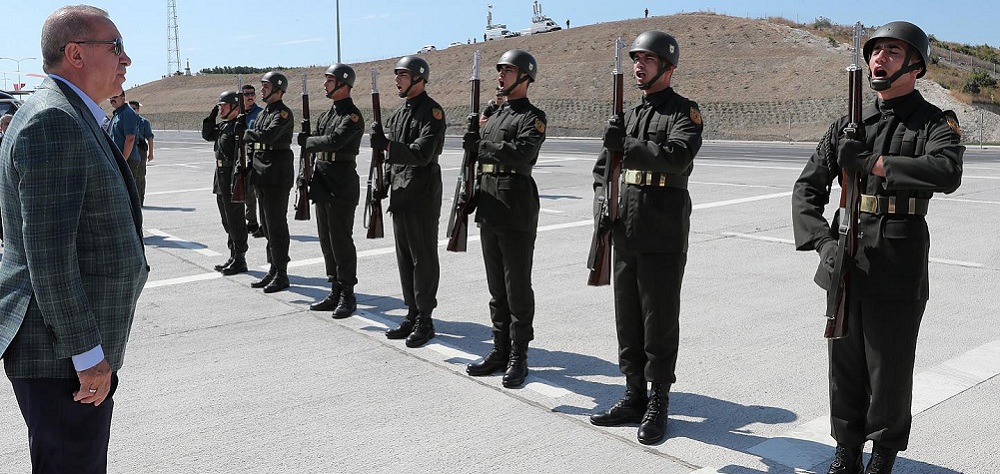Alwaght- After two members of Turkish special operation forces were killed in a guided missile attack by the Syrian Kurdish People's Protection Units (YPG) from Tel Rifat town of northern Syria, President Recep Tayyip Erdogan of Syria on Friday said that Turkey is losing patience with the Kurdistan Workers’ Party (PKK) in northern Syria and can launch a new operation in this region.
Turkey sees the YPG group as the Syrian branch of the PKK, a group blacklisted as a terrorist organization by Ankara.
Following the threat, Reuters news agency, citing Turkish security and military officials, reported that deployment of commandos and armored vehicles to the Syrian border might bear witness to the seriousness of the Turkish threats.
Erdogan is scheduled to meet with US President Joe Biden and Russian President Vladimir Putin on the sidelines of the G20 summit in Rome, Italy, at the end of this month and raise with them confrontation of the Kurdish forces in Eastern Euphrates region, and he will probably postpone the final decision until later in these meetings.
But what is motivating Erdogan to start a new military campaign in Syria’s north?
Why is Erdogan planning new encroachment?
There are three hypotheses that can explain the motivation driving Erdogan plans for a new military action against the Kurds in northern Syria.
First hypothesis: The plan for military action in northern Syria against Kurdish US allies is Erdogan’s new game and pressure card set to be shown to President Joe Biden Administration. Since the new American administration assumed the power at the White House, Turkey has been badly disfavored by Biden, something bringing chill to their relations. A trip to the US of Erdogan in mid-September did not seem to have made any achievements. Some analysts suggest that Erdogan, using the threats of anti-Kurdish action, seeks to push Washington to modify its stances towards Ankara and that he essentially plans no action.
Second hypothesis: Erdogan's visit to Sochi, Russia, and meeting with President Vladimir Putin on September 29 on the heels of meeting of the presidents of Russia and Syria caused a new agreement between the Russian and Turkish leaders about a new Turkish military action in Eastern Euphrates, a region of great importance for Turkey because of its proximity to the Turkish border and the massive presence of the Kurdish militants posing threats to Turkey. Possibly, Erdogan has gotten a green light from Putin for a limited operation and this is encouraging him to make a move.
Third hypothesis: Another hypothesis has to do with Turkey’s internal politics. It is likely that Erdogan seeks to protagonize himself and the ruling Justice and Development Party (AKP) to win votes of the public in the parliamentary and presidential elections. The reality is that currently the Turkish economy has become extremely vulnerable; each US dollar trades for 9 Turkish liras, making the citizens frustrated with economic management of the country. In such a situation, Erdogan is trying to mobilize the nationalists at home and divert public opinion from the economic problems with a new adventure in Syria to prepare the ground for a shock to society, so that the AKP can remain in power.
West can severely react to Erdogan
So far, Turkey launched three operations in Syria: Euphrates Shield (2016), Olive Branch (2018), and Peace Spring (2019). All these operations were assisted by Ankara’s Syrian militant allies, part of them terrorist groups. Although the last operation drew criticism from the West, the Western governments turned a blind eye to the first two campaigns against the Kurds. But circumstance have changed now and any Turkish military action can meet strong reaction from the West in the form of political and economic sanctions. The present White House administration is nothing like that of Donald Trump and Biden does not intend to adopt a policy of political indifference to Erdogan in the north and will very likely impose sanctions. The same reaction can come from the European Union, especially its key decision maker France that is at letterheads with Turkey in the Mediterranean.
Central Syrian government would not remain silent
Like the West, Damascus government, considering the military circumstances and the battle against a litany of foreign-backed terrorist organizations, did not take considerable measures in the face of the Turkish incursions, though it has a strong motivation to resist the Turkish attacks. However, in the new conditions, the Syrian government will not remain silent in the face of the Turkish occupationism, and a military confrontation is not unthinkable.
Kurds facing a dilemma: Taking the existential threat or cooperating with Damascus
Like in the past, Kurds are the main target of the threats of military action recently put forward by Erdogan. In the past, they put all of their eggs in the American basket, incurring irreversible losses. Losing Afrin town and being subjected to a campaign of demographic change are examples of these losses. In Afrin, once a predominantly-Kurdish town, now the Kurds are a minority.
Syrian Kurds, leading Syrian Democratic Forces (SDF), would again be the main losers of the northern Syrian battleground equations should they repeat the mistake of tying their fate to the American policies. It is time for them to engage in negotiations with Damascus and strike a deal with it to attract the security cover they need before Erdogan makes any new military move.



























